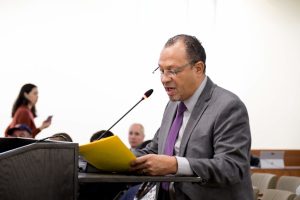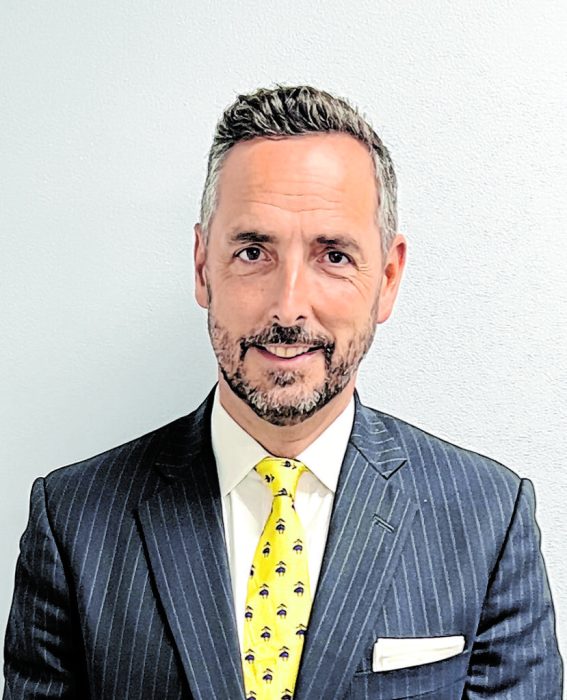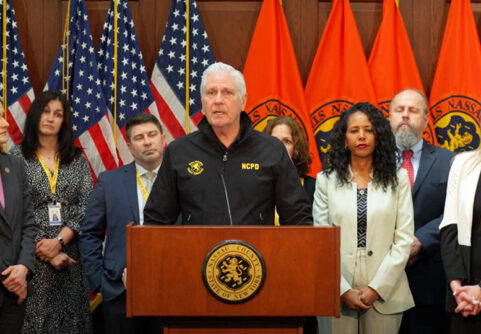
(Photo by Frank Rizzo)
If there is a “poster man” for the unintended circumstances of New York State’s bail reform, his name is Jordan Randolph of Bellport.
On Jan. 12, Randolph was allegedly driving drunk when he rear-ended another vehicle on the William Floyd Parkway in Shirley, killing Jonathan Armand Flores-Maldonado.
Convicted of numerous felonies and misdemeanors, courts in both Nassau and Suffolk counties had opportunities to jail Randolph. But published reports suggested that ambiguities in the new law tied judges’ hands, and Randolph went free—even after his fatal crash.
Randolph’s case was brought up several times on Jan. 15, when the Carle Place Civic Association hosted its monthly meeting. The agenda included a presentation on the new bail reform law. Speakers were Nassau County Police Commissioner Patrick Ryder and Lt. Brian Sullivan, president of the Nassau County Sheriff’s Correction Officers Benevolent Association.
“We didn’t get to a precipice and change the way we’re doing things,” Sullivan said. “In my opinion, we fell off a cliff and we need to have a bit of a voice of sanity.”
Throughout his talk, Sullivan, a self-described conservative, pushed back against liberal and progressive attitudes toward crime and punishment. He questioned the claim of proponents of bail reform that people are languishing in jail because of racial discrimination and poverty.
“The truth is that prior to Jan. 1 of this year, approximately 70 percent of all people that were arrested in this state for misdemeanors and non-violent felonies were released almost immediately soon after their arrest, on their own recognizance, or on bail pending their criminal trials,” he pointed out. “The other 30 percent were evaluated under a judge’s discretion for the risk of flight, their criminal record and their probability of returning to court.”
The reform was passed as part of the budget, instead of through individual legislation, said Sullivan, a veteran of legislative lobbying.
“That means there were no stakeholders allowed to speak up on this issue,” he said. “There were no public hearings and no opportunities for public hearings. No voice of dissent was allowed to be heard over what was being proposed by the legislators, and no opportunity to expose very dangerous things that will result from these changes.”
He added, “I don’t think anyone who can’t afford a $250 or a $500 bail should be languishing in jail either. But address that issue, that inequity in bail reform.”
Sullivan also criticized the critics of those who criticized the reforms.
“They say we are fear mongers,” he said. “Tell that to the parents of the young man who got killed out in Shirley. The perpetrator [Randolph] had several DWIs on his record, but kept getting released. I know there’s a warrant for his arrest because he didn’t show up to court.”

(Photo courtesy of Maryola Dannebaum | Nassau County Legislature)
Ryder spoke up to say that his officers had arrested Randolph—he had just gotten the news on his phone.
The following day, Randolph was held without bail for violating probation from a 2017 drunk driving conviction in Nassau County.
Sullivan said he had a handout with a sheet of crimes not eligible for parole, and told attendees that, “You’re going to be amazed with what people walk out the door with,” and went on to accuse progressives of lying about what constitutes non-violent felonies.
The Nassau County Jail, he noted, had programs to deal with drug addiction and mental illnesses. Instead, accused criminals are released back into society without the benefit of such assistance.
“Is that being progressive?” he asked.
Sullivan pleaded with audience members to educate themselves on the issue, and contact and demand accountability from their state representatives. He pointedly noted that this was an election year.
The Commish Speaks
Ryder mentioned the case of Westbury’s Gerard Conway, 22. He broke into four Westbury businesses on Dec. 29, was arrested and charged with burglary in the third degree. Released under the bail reform law, Conway then burgled the Bagel Boss in Carle Place on Jan. 1.
“We arrested him again, and now he’s out, but he’s getting the mental health help that he needs because of his family,” Ryder said. “He’s a Chaminade graduate, VMI college guy. The kid’s got a lot going [for him], but there’s a problem there.”
An egregious case Ryder brought up involved two Chilean nationals arrested in December for a string of high-value burglaries in wealthy north shore communities.
“We threw them into jail,” Ryder related. “But [the law is] retroactive. The judge lets them out and tells them, ‘Tomorrow, go to probation and get your electronic monitoring bracelet and put them on your ankles.’ Guess who didn’t show up the next day?”
Ryder appeared on the Fox & Friends TV show recently and told host Brian Kilmeade, “They’re sitting on the beach in Chile with the million-dollar proceeds they stole from us and giggling at us. Because that’s how ludicrous we’ve gone in the extreme.”
Ryder pledged his department will continue to fight crime and keep reducing the crime rate, but admitted that it will be a challenge.
“What’s going to be affected without a doubt is quality of life,” Ryder warned. “Because of these low-level crimes, non-violent felony cases that are walking out. They’re going to commit crimes in our neighborhoods we have always expected not to see.”
He concluded, “The only way to fix it is to send a message to Albany to change [the law].”






























